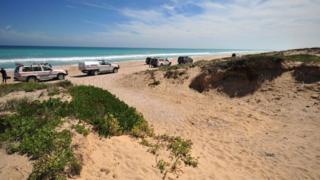Home » Australasia »
Are backpackers worried about Australia?
A Brazilian backpacker is found naked and screaming for help on a remote beach in South Australia, while her friend from Germany is covered head-to-toe in blood.
They are the victims of Roman Heinze, a 61-year old Australian, who was sentenced to at least 17 years in prison on Wednesday for kidnapping, assault and indecent assault.
During his trial the women, both aged 24, told the court how they thought they would die during their ordeal at Salt Creek, south-east of Adelaide. The pair had met their attacker on an online classifieds site.
Justice Trish Kelly said Heinze had cast Australia in the worst possible light. “In committing these crimes you have undermined yet again the reputation of this country as a safe, friendly and attractive destination for young backpackers from all over the world,” she said.
The crimes of the Adelaide man are a shocking reminder of the dangers potentially facing foreign backpackers in Australia.
Between 1989 and 1993, serial killer Ivan Milat murdered seven young travellers, including two British women, in the Belanglo State Forest south-west of Sydney.
The man who led the investigation, Clive Small, a former police assistant commissioner in New South Wales, believes backpackers from overseas are an “easy target” for criminals.
“Backpackers are still looked at [by criminals] because they are isolated, they are not going to be missed within the next day or night because they didn’t come home, and that gives the offender a greater chance of escape,” Mr Small explained to the BBC from his home in Sydney.
“Because of their constant movement and travel they don’t keep regular contact with family back at home. When they [relatives] don’t hear from them for a while they just assume that they have been hitchhiking or changing location, and so it may well take some time before they start to become concerned.”
Last August, two young Britons, Mia Ayliffe-Chung and Thomas Jackson, were stabbed to death at a hostel in Home Hill, south of Townsville. A Frenchman has been charged with their murders.
Also in Queensland, a 22-year-old woman from Liverpool was rescued by police in March after being allegedly raped and held captive for weeks by a man she had befriended in the city of Cairns.
The tropical city is a gateway to the Great Barrier Reef, and is towards the northern tip of the well-worn backpacker trail that snakes along eastern Australia.
Gap year appeal
Cairns’s warm autumn climate, glittering nightlife and jobs are a magnet for those seeking adventure from afar.
“I chose Australia because I thought it was one of the safest places and so far it hasn’t proved me wrong,” said Madison from the United States.
“There are always going to be a few weirdos. You’ve just got to steer clear. I’ve come across them in America, I’ve come across them here.”
So has Tom, 18, from north Wales, who is travelling on a gap year with two mates.
“Yeah, there are a few oddballs over here. Just some strange people,” he said.
Becky Chalmers, a gap year student from Wotton-under-Edge in Gloucestershire, said her parents worried more than she did.
“If we think anything is dodgy, we just stay away from it. We just don’t go anywhere near it,” she said.
Few of the young international travellers the BBC spoke with on the waterfront at Cairns knew much about the grisly side to Australia’s backpacker history, such as the Milat murders, the killing of the Huddersfield tourist Peter Falconio at Barrow Creek in the Northern Territory in 2001, and an arson attack at a hostel in the farming town of Childers the year before that killed 15 people.
“When you hear of a young girl being kidnapped, or somebody else being raped or, on rare occasions, people being murdered as well, then obviously it damages Australia’s reputation,” explained Roger Maynard, a veteran Sydney-based journalist, who has written books on the Milat and Falconio murders.
Visitor numbers strong
The overwhelming consensus on the Esplanade in Cairns is that Australia is safer for travellers than most countries. According to Australian government statistics, the number of international visitors staying in backpacker accommodation grew by 8% to more than 645,000 in 2016.
But there are other concerns, too. Exploitation of backpackers on farms has been well documented. Often those who are underpaid and overworked are, for example, picking fruit to satisfy employment criteria to extend their working holiday visas.
“There’s plenty of scammers out there,” said John Lynch, the manager of The Jack Hotel in Cairns.
“They play on the fact that some of these backpackers are quite desperate to stay for another year, so they are willing to perhaps work for a little bit less than they should. But it’s about doing your research, doing your homework. Unfortunately being naive and believing everything you hear is the exact way you might get yourself into trouble.”
The vast majority of travellers will head home with treasured memories and friendships that will never fade, but Australia should come with a precautionary health warning, according to Mr Maynard.
“The problem is a lot of young people who come here tend to think it is very much like back home and they get a false sense of security, and they tend to drop their guard,” he said.
“They might party too much and they may not be quite as responsible as they might be back home. Be responsible, be aware of potential dangers but don’t let it ruin your trip.”
Source: Read Full Article



